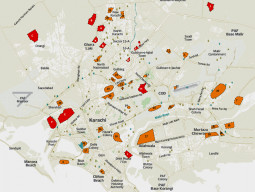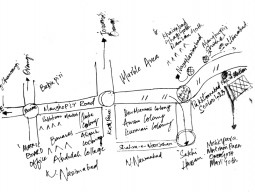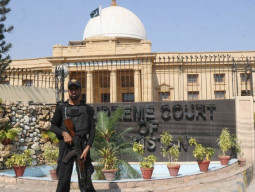
The lawmakers who won the elections from the Manghopir constituency are not ready to accept their failure.
Muttahida Qaumi Movement (MQM) MPA Adil Khan, who won this seat in the previous elections, blamed the government, the law enforcers and even the Awami National Party (ANP) for allowing this neighbourhood to become a no-go area. Clarifying that MQM is not a law enforcement agency, Khan told The Express Tribune that their party clarified time and again that the incoming IDPs should be kept in check. “When we insisted the IDPs should be registered properly, we were dismissed by those who claimed it was propaganda.”
The ANP reacted irresponsibly at the time and gave our requests an ethnic angle, he claimed. “Now the result is in front of us.” Khan felt that poor checks and local support were the main factors that made the Taliban so strong. As a result, Pirabad and Manghopir police stations have been attacked several times while over a dozen policemen have also lost their lives.
For their part, the ANP insisted that the IDPs who came two years ago were only displaced persons and not Taliban. “If the Taliban are present in Karachi, it’s because of poor law enforcement,” said party leader Bashir Jan.
The Rangers are, however, confident that there is not even a single no-go area in Karachi, especially for their men. “We can enter any neighbourhood whenever we want,” said a spokesperson. He admitted that criminals are present across the country but added that their presence does not make an area off limits.
Surprisingly, the residents are unperturbed by these developments. “If we weren’t happy here, we would have migrated a long time ago,” said a resident. “The Taliban have only four targets – the law enforcers, police informers, those with political and sectarian affiliations, and cable operators.”
Still going strong?
An official told The Express Tribune that none of the hardcore Tehreek-e-Taliban Pakistan (TTP) suspects have been arrested or killed by the law enforcers yet. So far, the police and Rangers have only caught people who were previously criminals and had recently joined the TTP bandwagon. “The Taliban is not weak enough to be caught so easily and give in to the law enforcers,” he said.
The officer explained that the Taliban are highly concentrated on the entry and exit points of these neighbourhoods. They communicate with each other through cellphones and walkie-talkies and inform their supervisors when they see law enforcers. “No wonder the militant strongholds stay the same despite operations and arrests.”
On the other hand, the policemen believe that frequent transfers and postings prevent them from taking concrete steps. “When the higher officials, such as the IGP, DIG and SSP, are ignoring terrorism and focusing on frequent transfer postings to make more money, this was bound to happen,” said an officer,
According to him, the law enforcers should cordon off the entire neighbourhood from all sides and hold a non-stop operation until they completely wipe out terrorism.
Published in The Express Tribune, April 4th, 2013.
COMMENTS (1)
Comments are moderated and generally will be posted if they are on-topic and not abusive.
For more information, please see our Comments FAQ




































"Surprisingly, the residents are unperturbed by these developments. “If we weren’t happy here, we would have migrated a long time ago,” said a resident. “The Taliban have only four targets – the law enforcers, police informers, those with political and sectarian affiliations, and cable operators.”"
Wow, this is the mentality that is imported to Karachi, for such people Karachi is just goose that lays golden egg, whether the person is from low or elite class. Irrespective of ethinicty, unless people start owning karachi things will go worst.